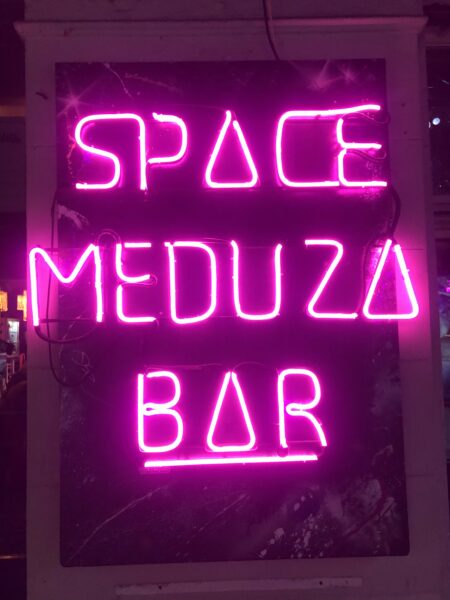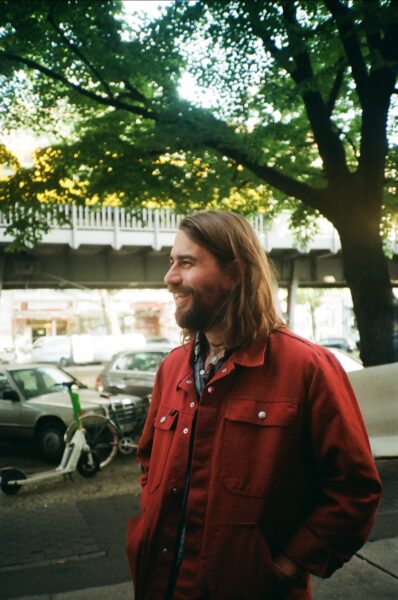When James Michael Rodgers arrives at the Space Meduza, located in the heart of Berlin-Kreuzberg, I can already sense the special connection that the artist, curator, booker, and PR agent one-man-show has with this place, where his Space Sessions take place every Saturday night – starting four years ago and still running. As we grab a drink at the bar, he walks me and photographer Giulia around the back rooms of the place, where we eventually have a seat to talk about the idea of the sessions, his views on curation, and how it all connects with his own artistic endeavours as a musician.
“I came here [to Berlin] and I was frustrated because I felt there’s no venues for 80 to 100 capacity where they nurture the independent music scene. And I still feel like that, especially with folk music.” (James Michael Rodgers)
“Make Folk Cool Again”
How many good ideas have emerged from a series of letdowns and frustrations? When James came to Berlin some years back, he recounts that there was no decent chance for independent acts to get their music out beyond a smaller scale – and to make some money off it essentially. “The bookers here, they don’t even give you support slots”, he laments. “My friends who go on tour all the time hardly ever support bigger acts. That really pissed me off”, he continues, “I felt like there was no place to go and earn money in Berlin as a singer-songwriter”.
“I felt the folks in here needed a space and I needed a space.”

Photo by Andreas Peters
James is from Saltcoats, Scotland, where the scene is a different one, as he describes to me: “You get support slots all the time, which are paid. So you’re going on stage to a hundred people and you’re coming away with 100 quid doing your own set. And that’s just normal. And then there are also bars where you can go and play cover music and stuff easily. You get paid, so you can make money being a musician. You can’t do that here very easily.” James turned his frustration into action. First, he got the chance to curate sessions at the Neulich Brauhaus in Neukölln, and then, later on, approached the Space Meduza people to start weekly newcomer happenings there.
“I wanted a space where the musicians could properly perform in Neukölln and Kreuzberg and actually get paid for it. And I like the idea of someone actually hosting it, you introduce them.”
The story as such, of course, would not go without the dramaturgical breach that the Covid era brought into the whole affair. Yet, whereas Neulich closed down after a major outbreak, Space Meduza managed to keep going, even under very restricted circumstances. “Of course, there were some weeks where we didn’t do it, but we were really determined to figure a way”, James recounts.
“There is a great audience for this kind of music. We get a lot of walk-ins now, which we never had at the start. There was a sweet spot at some point where you looked into the audience and it was the whole folk scene. There were like a hundred people, all musicians and friends of them. It was just a fucking energy.”

Thala (photo by Garry Jones)
Being Heard And Breaking Through
Among the countless artists that have graced the stage at Space Meduza, Berlin-based Mone and London-based Thala have been just two acts for whom James’ stage provided an opportunity to get heard and get recognized and who were quick to cherish the promotion of having been performing guests there. Thala, who recently released her noteworthy EP In Theory Depression, remembers that the Space Meduza “gave [her] one of [the] first stages to perform on. It is a great place and has improved even more in the past couple of years”.
“Space Sessions is one of the wonderful events celebrating our folk scene and bringing in new international acts. Its host and booker, James Michael Rodgers, was one of the first people I met when playing all the open stages and sinking into the Berlin folk community. Being visible in the scene, playing a lot and supporting other musicians has definitely been my way of getting booked for the Space Sessions as well as other events. Just writing to James works too though.” (Mone)

Mone, (photo by Rainer Stosberg)
Mone still calls Berlin her home and is looking forward to her sophomore record this fall. She values the Space Sessions as one vital place in a city that is already packed with a raw spirit and an open community to those who try to succeed. “The open mic scene in Berlin is very vibrant and welcoming to newcomers”, she tells me, “you can go out and play music every night if you want to. It’s one of the reasons I love the city”. Yet, it is the people and events such as at Meduza which make it the place it is. Mone points out:
“There’s an ever evolving international community of musicians, and a tight core of people organizing events and providing stages. It gives newcomers the chance to easily make friends, get lots of hours of playing in and collaborate. Many different musical projects and collaborations are formed within the scene, sometimes just for one show and sometimes longlasting. It feels a bit like a big, strange family.” (Mone)
A Curating Artist
As a booker and presenter of the sessions, James Michael Rodgers is an exception, being a musician himself, and that primarily, as he stresses. “This is just a side thing”, he says. “For me, this is a passion project. I only still do it because I realized that there’s still no other people doing it.” As such, it is first and foremost the aspect of building a strong community that stands at the heart of the Space Sessions amidst the Berlin folk/songwriter scene. And further on, dig out the rare talent that deserves an audience.
“When I see people at the open mics, for instance, and I haven’t seen them before, sometimes I just feel it deep down. I’ll be like, oh, that person’s amazing. Straight up, play them. Sometimes I see someone and they’re not quite there yet, but they’ve got a lot of potential. I’m like, tell me when you’ve got 40 minutes. And then also a lot of people write to me on the Space Sessions. That’s quite overwhelming, actually, for such a small bar.”
But whatever talent crosses the attention of its host, it always was and is about honesty and connection among like-minded music lovers in the artistic space, making sure to keep the underground, and authentic signature it has established, running. “I’ve had some pretty big names come and play”, James remembers. “And then there’s sometimes just a gem where you’re like, holy shit, I’m glad they contacted me”, he goes on. The sessions provide a welcoming stage for those waiting to be discovered, as well as, for those already on the rise and wanting to expand their listenership.
“I’m never going to get paid more than the artists playing that night. Never. That’s my rule.”

Photo by Giulia Leonarduzzi
As we touch the subject of artist payment each night, it is where the true character of the Space Sessions unfolds. “They very rarely make under 100 euros each for a 40-minute-set of originals. I think it’s pretty good in Berlin.” Thinking it could still be more, James makes sure each and every act leaves with an adequate amount of money. “We put 50 euros in the hat from the bar”, and further advise the audience to give as much as they can and want to. “Any venue that puts on an act should at least be able to guarantee 100 euros”, he repeats.
A Platform For Many
It is not a surprise for anyone into folk music, or what the Western gaze has established as such, that “is quite a white genre”, James remarks. “People of Color aren’t getting to play as much”, he is aware “ and the LGBTQIA+ community is underrepresented. That’s why I’m starting to change the style of music as well”, he explains to me.
“Among the musicians there is a strong community. We go to each other’s gigs and we all help each other. When I first moved here, I had friends who were like, okay, here’s bookers in Switzerland. And that’s how I made money. Because some people are not keeping their cards to their chest.”
In terms of a female representation however, there is a new wave coming, as James is sure, stressing this generation of budding women songwriters has a “beautiful perspective for folk music… they’re able to come through more”, he argues, and “it’s like the first generation that’s got way more freedom than they’ve had before”. Well, the “zeitgeist has changed” and we both agree it’s a good change. And as we go down that subject, nearing the end of our talk, he reflects on his own position in that great big pool of artistic representation: “For me, as a male songwriter, I’ve had crisis points where I’m like, does anyone want to hear a hairy guy in his thirties sing about love anymore? You’ve got to trust that your perspective is still valid and interesting. But it has made me super conscious about that.” Such insight, it seems, is a fitting conclusion. There is of course an ever-rising challenge helping to promote those worthy of being asked on stage, especially as we have reached the peak of a digital thirst for attention on social media and as it doesn’t look like that’s about to change, independent institutions such as the sessions over at Meduza are a vital way of keeping your underground thirst alive.
Embrace The Creative Process
For any newcomer adopting open mic stages such as the one at Space Meduza serves not only as a stepping stone towards recognition, but also as an artistic process to honing one’s craft, and developing material and skills while in the act. “Important steps have been to take it one step at a time and to learn how to not demand the world on a silver platter”, Thala reflects on the process and stresses that “constantly learning new things” is an essential part of growing up in the music industry. “There is no simple answer to this”, she summarises.
These may just lead to the ability to really dig deep into your art, such as she has done for her recent EP In Theory Depression, which finds her uncovering “a lot of hidden trauma that needed to be processed”. In the end, she is “learning to be okay” with the unpredictable turmoils this business has to offer. And that, it seems, is a vital lesson to be learned. Mone tunes in to that notion, as she emphasizes that she has learned “to let go of the idea of ‘making’ it” towards a mindset of “embracing the process of being creative”. That, one could sum up, is one of the keys of musicianship then, or to put it in Mone’s words, “as long as you love the process, you are successful”.
“Music is like a drug once you start making it, you fall in love, there is nothing more important in your life, it becomes ever so overall consuming. There are great days where you feel like you’re gonna conquer the world and then there are the bad ones, the ones where you question every move you’ve ever made and where it really hits you that: That is what I am doing now.” (Thala)
The Space Sessions open their doors every Saturday night at the Space Meduza Bar. Swing by and be part of the community.



